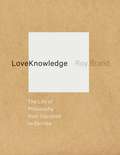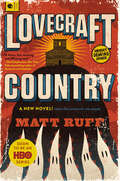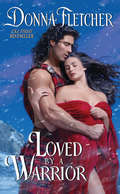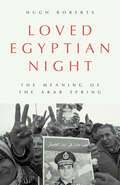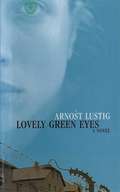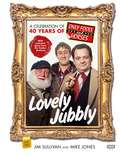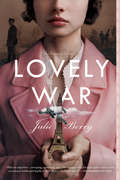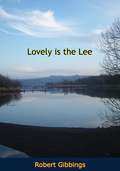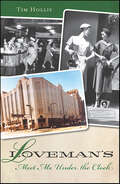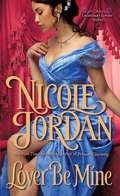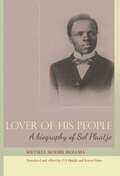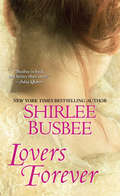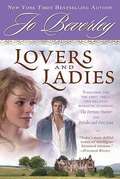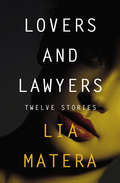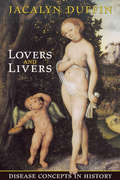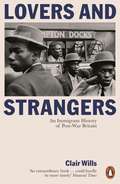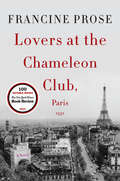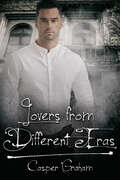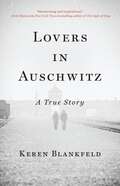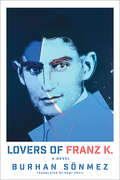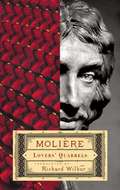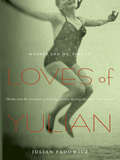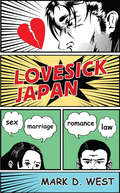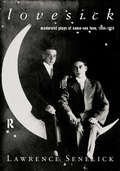- Table View
- List View
LoveKnowledge: The Life of Philosophy from Socrates to Derrida
by Professor Roy BrandSince its inception, philosophy has struggled to perfect individual understanding through discussion and dialogue based in personal, poetic, or dramatic investigation. The positions of such philosophers as Socrates, Spinoza, Rousseau, Nietzsche, Foucault, and Derrida differ in almost every respect, yet these thinkers all share a common method of practicing philosophy—not as a detached, intellectual discipline, but as a worldly art. What is the love that turns into knowledge and how is the knowledge we seek already a form of love? Reading key texts from Socrates to Derrida, this book addresses the fundamental tension between love and knowledge that informs the history of Western philosophy. LoveKnowledge returns to the long tradition of philosophy as an exercise not only of the mind but also of the soul, asking whether philosophy can shape and inform our lives and communities.
Lovecraft Country: A Novel
by Matt RuffThe critically acclaimed cult novelist makes visceral the terrors of life in Jim Crow America and its lingering effects in this brilliant and wondrous work of the imagination that melds historical fiction, pulp noir, and Lovecraftian horror and fantasy.Chicago, 1954. When his father Montrose goes missing, 22-year-old Army veteran Atticus Turner embarks on a road trip to New England to find him, accompanied by his Uncle George--publisher of The Safe Negro Travel Guide--and his childhood friend Letitia. On their journey to the manor of Mr. Braithwhite--heir to the estate that owned one of Atticus's ancestors--they encounter both mundane terrors of white America and malevolent spirits that seem straight out of the weird tales George devours.At the manor, Atticus discovers his father in chains, held prisoner by a secret cabal named the Order of the Ancient Dawn--led by Samuel Braithwhite and his son Caleb--which has gathered to orchestrate a ritual that shockingly centers on Atticus. And his one hope of salvation may be the seed of his--and the whole Turner clan's--destruction.A chimerical blend of magic, power, hope, and freedom that stretches across time, touching diverse members of two black families, Lovecraft Country is a devastating kaleidoscopic portrait of racism--the terrifying specter that continues to haunt us today.
Loved By a Warrior
by Donna FletcherIt has been prophesied that four men, raised as brothers, will bring Scotland back to her rightful glory. It is time for the second to take up his sword. When a Highland warrior fights, he fights for honor. And when Reeve MacAlpin sees a beautiful stranger surrounded by bandits, he does not hesitate to do the honorable thing and dispatch her would-be assailants. But at her first grateful touch, his instinct to keep her safe is surpassed by a longing to keep her close . . . and to fulfill her every desire. For as long as Tara can remember, she has lost the people she loves most-a curse that is sure to doom anyone who shows her kindness. She can never love without bringing death-and though her powerful Highlander champion tempts her beyond imagining, she fears that to give herself to him means his downfall. And yet she knows she must tempt Fate . . . for to resist him would be just as unthinkable.
Loved Egyptian Night: The Meaning of the Arab Spring
by Hugh RobertsWhy did the Arab Spring have such calamitous outcomes?Loved Egyptian Night fundamentally reassesses the Arab Spring, refuting the stories the Western powers fed to the world. There is no doubt that the toppling of Ben Ali in Tunisia in January 2011 and what it led to amounted to a political revolution.But the uprisings in Egypt, Libya and Syria - countries with quite different histories and political traditions - were never revolutions. As Hugh Roberts explains, the bitter ends of these episodes were inscribed in their misunderstood beginnings. To celebrate these uprisings as 'revolutions' preempts and inhibits critical analysis and expresses an abdication of intellectual responsibility.After so much wishful thinking, what remains is the debris of a cynical pretension. Outside interference, ostensibly on behalf of these 'revolutions', reduced Libya to anarchy and condemned Syria to a devastating proxy war now in its twelfth year.In Egypt, the Free Officers' state was re-booted in its most brutal ever form. The Americans and Europeans did not vainly try to help the Egyptians or anyone else escape from authoritarian rule. Instead, they contrived to seal them up in it. The long oppression of these societies, Kipling&’s 'loved Egyptian night,' is not going to be ended by the Western powers; these days it is guaranteed by them.
Lovely Green Eyes: A Novel
by Arnost LustigFifteen-year-old Hanka Kaudersov has ginger hair and clear, green eyes. When her family is deported to Auschwitz, her mother, father and younger brother are sent to the gas chamber. By a twist of fate, Hanka is faced with a simple alternative: follow her family, or work in an SS brothel behind the eastern front. She chooses to live, her Aryan looks allowing her to disguise the fact that she is Jewish. As the German army retreats from the Russian front, Hanka battles cold, hunger, fear, and shame, sustained by her hatred for the men she entertains, her friendship with the mysterious Estelle, and her fierce, burning desire for life. Lovely Green Eyes explores the compromises and sacrifices that an individual may make in order to survive, the way a woman can retain her identity in the face of appalling trauma, and the value of human life itself. This is a remarkable novel, which soars beyond nightmare, leaving the reader with a transcendent sense of hope.
Lovely Jubbly: A Celebration of 40 Years of Only Fools and Horses
by Jim Sullivan Mike Jones** The No. 11 Top Ten Sunday Times Bestseller **Long Live Hookey Street ...Ménage et trois! It's been 40 years since John Sullivan's Only Fools and Horses first graced our television screens. In this new official guide, packed full of rare and never-before-seen photographs, Mike Jones and Jim Sullivan - son of John and co-writer of the hit West End show Only Fools and Horses the Musical - chart the creation and evolution of the nation's favourite comedy series. Including behind-the-scenes info and interviews with those who helped make the show a success, and more than a word or two from Del, Rodders and the rest of the Peckham faithful, here we take an episode-by-episode look at what made Only Fools and Horses work.Lovely Jubbly!
Lovely War
by Julie BerryA sweeping, multi-layered romance set in the perilous days of World Wars I and II, where gods hold the fates--and the hearts--of four mortals in their hands. <P><P>They are Hazel, James, Aubrey, and Colette. A classical pianist from London, a British would-be architect-turned-soldier, a Harlem-born ragtime genius in the U.S. Army, and a Belgian orphan with a gorgeous voice and a devastating past. Their story, as told by goddess Aphrodite, who must spin the tale or face judgment on Mount Olympus, is filled with hope and heartbreak, prejudice and passion, and reveals that, though War is a formidable force, it's no match for the transcendent power of Love. <P><P>Author Julie Berry's critically-acclaimed writing has been called "haunting and unforgettable" by New York Times bestselling author of Salt to the Sea Ruta Sepetys and "utterly original and instantly engrossing" by Publishers Weekly.
Lovely is the Lee
by Robert GibbingsReaders of Robert Gibbings’ previous illustrated tales of river life such as “Sweet Thames Run Softly” (1940) and “Coming Down the Wye” (1942) will need no introduction to the unique style that this author uses to explore the people and places that he describes with warmth and affectionate good humour. But the real reason that his books have become so collectable is the delicate and evocative engravings with which he illustrates his subject.In “Lovely is the Lee”, first published in 1945, Gibbings has never written with more ease and grace than in this exploration of the River Lee in Ireland. Here is the simple and ancient life which still exists in Ireland, centered in tiny villages in the southern and western part of the Irish Free State. Gibbings finds every part of that life absorbing. As a naturalist he is sensitive to the bird life of the western counties and islands, and describes with an accurate beauty these winged inhabitants.Richly illustrated throughout with engravings by the author.
Loveman's: Meet Me Under the Clock (Landmark Department Stores Ser.)
by Tim HollisIn an era when local department stores still thrived, Birmingham shoppers had different stores from which to choose. But when customers sought more than bargain prices, when they demanded unparalleled quality and outright luxury, they chose Loveman's. The first store opened in Birmingham in 1887, and the chain eventually grew to include locations in Huntsville and Montgomery, embracing those from throughout the state who valued an upscale shopping experience. Weathering the Great Depression, a devastating fire that destroyed the original location in 1934 and historic civil rights protests in the early 1960s, Loveman's proved to be an enduring name through many eras of change until finally closing its doors in 1980. Now, Birmingham historian Tim Hollis chronicles the sterling history of this celebrated store's commitment to excellence.
Lover Be Mine: A Legendary Lovers Novel (Legendary Lovers #2)
by Nicole JordanAs the wickedly seductive Wilde cousins seek true love by taking a page from history's legendary love stories, Lord Jack Wilde plays a determined Romeo courting an enchanting Juliet. The last thing Sophie Fortin expects at a masquerade ball is a dazzling kiss from a pirate. Her desire quickly falters when she learns that her masked gentleman is devilishly scandalous Lord Jack, a member of the captivating Wilde clan--and a man she's forbidden to acknowledge. But when Jack begins a breathtaking seduction, Sophie can barely resist. Jack never imagined that the daughter of his family's mortal enemy would awaken such fierce passion within him--until one unforgettable kiss changes his mind forever. Soon, Jack is hell-bent on winning Sophie's hand, going so far as to abduct her to save her from marrying a rival nobleman. Determined to woo Sophie and her unyielding parents, Jack is faced with the one decision he'd sworn never to make. The secret heir to a prince, Jack has spurned his royal heritage for years . . . but for Sophie he'll risk all to turn a legacy of heartbreak into love ever after. Praise for Nicole Jordan and Lover Be Mine "[An] engagingly, well-plotted Regency that is worthy of the Bard and is the latest in Jordan's 'Wilde-ly' entertaining Legendary Lovers series featuring the scandalous Wilde cousins."--Library Journal"The hero and heroine in Jordan's latest stylishly written romance have sexual chemistry to burn, making Lover Be Mine the perfect choice for readers who crave Regency-set historicals that sizzle with sensuality."--Booklist"Nicole Jordan's new fairy tale series will steal your heart."--Cathy MaxwellFrom the Paperback edition.
Lover of His People: A Biography of Sol Plaatje
by Seetsele Modiri MolemaSeetsele Modiri Molema’s Sol T. Plaatje: Morata Wabo is the first biography of Solomon Plaatje written in his mother-tongue, Setswana, and the only book-length biography written by someone who actually knew him. The manuscript had long been housed in the Wits Historical Papers and was accessible only to scholars. D.S. Matjila and Karen Haire have mined the archive to produce the first English translation of Molema’s biography, Lover of His People. Molema balances Plaatje’s public and political persona – as a pioneer black politician and man of letters – with an intimate account of Plaatje, the human being: his physical features, habits, temperament, talents, personality, character, fears, struggles, dreams and aspirations. He illuminates the spirit of Plaatje, painting a personal portrait. Recognising that the biographer was an extraordinary scholar, intellectual and politician in his own right, the book includes an essay on the life and legacy of Seetsele Modiri Molema and his contribution to South Africa’s black intellectual heritage. The editors highlight some of the ways in which the book might be relevant to contemporary South African readers and, in inspiring them about a local historical figure, prompt critical thinking about pertinent issues such as gender, the future of African languages and the re-writing of history.
Lovers Forever
by Shirlee BusbeeA lady on the run encounters danger, passion, and a love that transcends time in the New York Times–bestselling author&’s steamy Regency romance. England, 1811. While fleeing the greedy clutches of her vile cousin, Lady Tess Mandeville is robbed and left for dead in the woods. She awakes with no memory of who or where she is. But fate intervenes when she wanders into a tavern and is mistaken for a barmaid. When her accidental profession leads her into the arms of Nicholas Talmage, the darkly handsome Earl of Shelbourne, the two share a night of unrivaled passion. Nicholas whisks Tess away to his estate to be his mistress, but soon her true identity comes to light. They realize their families are locked in a mysterious, decades-old feud that could put an end to their fledgling but fiery romance. As the star-crossed pair search for answers to the secrets of their past, they strive to defend an ageless love that not even death can extinguish . . .
Lovers and Ladies
by Jo BeverleyIn these two delectable novels, someone craves to be married and loses sight of the joys of true love—until their heart is opened unexpectedly. . . The Fortune Hunter : A stunning beauty rejects the charming suitor who isn't wealthy enough to save her impoverished family. But she can't so easily dismiss the memory of their sweet shared kiss. Deirdre and Don Juan : The dashing Earl of Everdon is most eager to marry someone-anyone-who will bear him an heir. But when he meets a quiet, well-bred lady who fits the bill, he must resort to an amorous dance of deception to gain her acceptance to his proposal. .
Lovers and Lawyers: Twelve Stories
by Lia MateraTwelve suspenseful stories from the author of the Willa Jansson and Laura Di Palma mystery series.A killer&’s using freezing weather and plenty of water to eliminate the city&’s homeless population, and a lawyer must identify the culprit before her client&’s arrested for the bizarre murders . . . An off-the-grid, clandestine meeting between an attorney and her recently acquitted lover takes a twisted turn . . . In 1918, as the flu pandemic decimates America, a nanny for a wealthy family is mistaken for dead, but that&’s only the beginning of her troubles . . . On a quiet Oregon beach on Native American land, a couple is debating whether or not they should get married when a stranger interrupts them . . .These are just a few of the mysterious tales in this collection that has &“tight plotting, good characterizations, and page-turning suspense. . . . Matera [is] one of the best contemporary mystery novelists&” (Booklist).Praise for Lia Matera&“[A] welcome respite from the mystery-by-formula crowd.&” —Kirkus Reviews on A Hard Bargain&“A satisfying blend of emotion, suspense and mystery.&” —The Pittsburgh Press on The Good Fight &“[Matera&’s] skill and literary flair are everywhere on display. Every word counts, and the pieces of the puzzle fit together with exhilarating precision.&” —ABA Journal on Designer Crimes &“This fast-moving tale is peppered with eccentric characters, snappy dialogue and a creative plot.&” —San Francisco Examiner & Chronicle on Star Witness
Lovers and Liars Box Set (Lovers And Liars Ser. #7)
by Paul Alan FaheyLovers and Liarsbrings together Paul Alan Fahey’s thrilling gay historical wartime romances for the first time in one box set. Contains the stories:Bomber's Moon: Following one’s heart can be a dangerous game, as Leslie Atwater discovers in this exciting story set during the early stages of the London Blitz. Leslie’s investigation into his lover Edward’s death takes him from Central London to a lighthouse on the English Channel. Tension mounts and, in a showdown with German spies, bombs fall, people die, and Leslie gets more than he bargains for in his search for the truth behind his lover’s untimely death.Weep Not for the Past: In early 1941, U-boats patrol offshore and are a constant threat to British livelihood, as are the daily bombings in London. Leslie befriends an enigmatic woman who resembles his favorite actress. But when disaster strikes, Leslie, Edward, and Leslie's cousin Caroline must work together to discover the truth. Was it a tragic accident or premeditated murder?A Manx Tale: In late summer 1941, Caroline and her new husband Cyril are honeymooning on the Isle of Man. In spite of the war raging around them, Caroline is enchanted by the small island’s history, quaint customs and superstitious beliefs. But as unexplainable events unfold, she becomes increasingly aware of sinister forces at work. Will logic and rationality prevail, or will it take a bit of magic and island whimsy to sort everything out?A Christmas in Kent: It's December 1941. Caroline, Cyril, Edward, and Leslie are home for Christmas from their recent exploits. On the surface all seems right within Caroline’s world, yet there’s something bothering her that can’t be ignored much longer. Christmas in Kent proves to be full of surprises.A Deadly Game of Malice: Caroline Graham is six months pregnant, miserable, and bored. Then a rash of poison pen letters circulate in the village and residents start to die. With Leslie’s help, Caroline must use all her cunning and put her life at risk to uncover a cold-blooded murderer -- a killer who continues to raise the stakes in a deadly game of malice.Kindred Spirit: A bomb explodes near St. Andrew’s Home for Boys, unearthing a skeleton of a young boy. As Leslie, Edward, and Robert set about identifying the remains, the shocking discovery stirs up an old antagonism between the two brothers and brings to light a series of repressed memories for Leslie. Ultimately, it rests on Leslie and Edward to solve the senseless murder of a kindred spirit.
Lovers and Livers
by Jacalyn DuffinCan a disease be an idea? A theory? Does disease exist without a patient to suffer from it?In Lovers and Livers, Jacalyn Duffin provides a lively overview of the ideas around disease. She introduces philosophical theories of disease and delves into the history of two distinct afflictions - one old, one new - which serve as examples to show how applying theory can uncover surprising aspects of the medical past and present. Written with humour and compassion, and using poignant examples from Duffin's own clinical experience, Lovers and Livers is based on a series of public lectures and innovates by utilizing audience participation and a wide variety of sources including art, poetry, literature, medical journals, newspapers. Duffin's first example of a disease concept - the now possibly defunct disease of Lovesickness - had its origins in the poetry of antiquity and its demise in twentieth-century scepticism, but Duffin argues that it may not be as passé as is generally thought. The second example is the new disease Hepatitis C. Duffin demonstrates that it too stems from ancient tradition and that it has been shaped by discoveries in virology and recent tragedies in transfusion medicine, as well as by legislators, journalists, and patients.In any given time and place, coherent concepts of disease emerge from combining social, cultural, legal, and scientific preoccupations with current epistemological priorities about what constitutes clear thinking. Lovers and Livers will be of special interest to scholars of history, philosophy, and medicine, as well as many others.
Lovers and Strangers: An Immigrant History of Post-War Britain
by Clair WillsSHORTLISTED FOR THE ORWELL PRIZE 2018 TLS BOOKS OF THE YEAR 2017'Generous and empathetic ... opens up postwar migration in all its richness' Sukhdev Sandhu, Guardian'Groundbreaking, sophisticated, original, open-minded ... essential reading for anyone who wants to understand not only the transformation of British society after the war but also its character today' Piers Brendon, Literary Review'Lyrical, full of wise and original observations' David Goodhart, The TimesThe battered and exhausted Britain of 1945 was desperate for workers - to rebuild, to fill the factories, to make the new NHS work. From all over the world and with many motives, thousands of individuals took the plunge. Most assumed they would spend just three or four years here, sending most of their pay back home, but instead large numbers stayed - and transformed the country.Drawing on an amazing array of unusual and surprising sources, Clair Wills' wonderful new book brings to life the incredible diversity and strangeness of the migrant experience. She introduces us to lovers, scroungers, dancers, homeowners, teachers, drinkers, carers and many more to show the opportunities and excitement as much as the humiliation and poverty that could be part of the new arrivals' experience. Irish, Bengalis, West Indians, Poles, Maltese, Punjabis and Cypriots battled to fit into an often shocked Britain and, to their own surprise, found themselves making permanent homes. As Britain picked itself up again in the 1950s migrants set about changing life in their own image, through music, clothing, food, religion, but also fighting racism and casual and not so casual violence.Lovers and Strangers is an extremely important book, one that is full of enjoyable surprises, giving a voice to a generation who had to deal with the reality of life surrounded by 'white strangers' in their new country.
Lovers at the Chameleon Club, Paris 1932: A Novel
by Francine ProseA richly imagined and stunningly inventive literary masterpiece of love, art, and betrayal, exploring the genesis of evil, the unforeseen consequences of love, and the ultimate unreliability of storytelling itself.Paris in the 1920s shimmers with excitement, dissipation, and freedom. It is a place of intoxicating ambition, passion, art, and discontent, where louche jazz venues like the Chameleon Club draw expats, artists, libertines, and parvenus looking to indulge their true selves. It is at the Chameleon where the striking Lou Villars, an extraordinary athlete and scandalous cross-dressing lesbian, finds refuge among the club’s loyal denizens, including the rising Hungarian photographer Gabor Tsenyi, the socialite and art patron Baroness Lily de Rossignol; and the caustic American writer Lionel Maine.As the years pass, their fortunes—and the world itself—evolve. Lou falls desperately in love and finds success as a race car driver. Gabor builds his reputation with startlingly vivid and imaginative photographs, including a haunting portrait of Lou and her lover, which will resonate through all their lives. As the exuberant twenties give way to darker times, Lou experiences another metamorphosis—sparked by tumultuous events—that will warp her earnest desire for love and approval into something far more.
Lovers from Different Eras
by Casper GrahamChase Crayford and Simon Lobb are boyfriends who accidentally travel to the year 3022. The United States of America is no longer the same country it was a thousand years ago. Asteroids have changed many things. Instead of cities or towns, there are safe zones, checkpoints, and wastelands overrun with dangerous mutated plants.The two men must survive long enough to return to where they’ve come from. Fortunately, they receive help from Brody Fisher, Mason Kirk, and Troy Whittemore, three hunters who work for the Search and Rescue Association.Feelings develop and blossom among them, but Simon and Chase can’t remain in the future. At least not indefinitely. The situation becomes even more complicated when they discover some plants have evolved further, making them much more dangerous.Can they successfully deal with the plants while they fight for their love and relationship?
Lovers in Auschwitz: A True Story
by Keren BlankfeldThe &“mesmerizing and inspirational&” (Judy Batalion) true story of two Holocaust survivors who fell in love in Auschwitz, only to be separated upon liberation and lead remarkable lives apart following the war—and then find each other again more than 70 years later. Zippi Spitzer and David Wisnia were captivated by each other from the moment they first exchanged glances across the work floor. It was the beginning of a love story that could have happened anywhere. Except for one difference: this romance was unfolding in history&’s most notorious death camp, between two young prisoners whose budding intimacy risked dooming them if they were caught. Incredibly, David and Zippi survived for years beneath the ash-choked skies of Auschwitz. Under the protection of their fellow inmates, their romance grew and deepened, even as their brushes with death mounted and David&’s luck in particular seemed close to running out. As the war&’s end finally approached and the time came for them to leave the camp, David and Zippi made plans to meet again. But neither of them could imagine how long their reunion would take or how many lives they would live in the interim. They had no inkling, either, of the betrayals that would await them along the way. But David did suspect that Zippi harbored a secret—one that could explain the mystery of his survival all those years ago. An unbelievable tale of romance, sacrifice, loss, and resilience, Lovers in Auschwitz is a saga of two young people who found themselves trapped inside a waking nightmare of the Nazis&’ creation, yet who nevertheless discovered a love that sustained them through history&’s darkest hour.
Lovers of Franz K.: A Novel
by Burhan SönmezAn inventive literary obituary for Kafka, this thriller of love and revenge brings the Cold War to life, from Paris and Istanbul to West Berlin and Tel Aviv.Amid the student protests in 1960s Europe, Kafka&’s best friend, Max Brod, becomes a target of their ire: Against the dying writer&’s wishes, he had published texts that never should have been part of his legacy. After Brod is injured in an attempted assassination, assailant Ferdy Kaplan is captured and questioned by Commissioner Müller of the West Berlin police.As his interrogation progresses, through dialogues in the police station, the courtroom, and the prison, Kaplan&’s background is revealed piece by piece, from the love story between him and his childhood friend Amalya, to their shared passion for Kafka, which leads them to join a radical group. But when a shocking discovery is made about the person who ultimately set Brod&’s attempted murder in motion, Kaplan and Müller agree to work together to expose the truth.In this gripping, thought-provoking tribute to Kafka, Burhan Sönmez vividly recreates a key period of history when the Berlin Wall divided Europe, and women were fighting for freedom and against tradition, adopting Jean Seberg&’s iconic short haircut from Breathless. More than a typical mystery, Lovers of Franz K. is a brilliant exploration of the value of books, and the issues of anti-Semitism, immigration, and violence that recur in Kafka&’s life and writings.
Lovers' Quarrels
by Richard Wilbur Jean Baptiste De Molière"I came to see that a line that simply says 'I love you,' at the right point in the show, is entirely adequate, that a great deal of verbal sophistication is not necessarily called for. . . . Speak-ability is so important. That's something I slowly had to learn about poetry, and something I had to work on always with Molière."--Richard WilburLovers' Quarrels is Molière's second full-length verse play, animated with deception and tangles of love.Richard Wilbur is a two-time winner of the Pulitzer Prize and a former Poet Laureate of the United States. His verse translations of Molière's plays have been performed for audiences throughout the world.
Loves of Yulian: Mother and Me, Part III
by Julian Padowicz&“This moving . . . fictionalized memoir&” of a young Jewish refugee starting over in a new country with his mother during WWII is &“a touching account&” (Publishers Weekly). Loves of Yulian is the poignant conclusion to the three-part memoir recounting the author&’s harrowing WWII escape from occupied Poland to America. After fleeing over the Carpathian Mountains into Hungary, eight-year-old Yulian and his resourceful but self-involved mother, Barbara, are on board a ship to Rio de Janeiro to await their turn for immigration to the United States. A former Warsaw socialite, Barbara has no marketable skills, only her looks, wits, and courage. Paying their way by selling the diamonds she had concealed in her clothing, they land in Brazil with only the diamond engagement ring on her finger. Somehow, it must finance both their stay and eventual passage to New York. Yulian, a sensitive Jewish boy raised by an overprotective, devoutly Catholic nanny, has difficulty interacting with other children and concludes that God is punishing him for abandoning Judaism. Complicating matters, he falls in love with a beautiful, but significantly older, fellow refugee, Irenka, who has been hired to take him to the beach. When his mother meets a man she truly cares for, Yulian hopes he has finally found his long-sought-after father figure. But Barbara&’s European upper-class values clash with her suitor&’s Latin ardor, leaving Yulian in the middle of a misaligned courtship, which he desperately wants to set right. Eventually, Yulian resolves his spiritual issues with the help of a celebrated Polish poet and his own teddy bear. His ambitious mother, however, must choose between a man she truly loves and her future in America. &“Mother and Me recounts a chilling journey during the war.&” —Booklist
Lovesick Japan: Sex * Marriage * Romance * Law
by Mark D. WestIn Lovesick Japan, Mark D. West explores an official vision of love, sex, and marriage in contemporary Japan. A comprehensive body of evidence—2,700 court opinions—describes a society characterized by a presupposed absence of physical and emotional intimacy, affection, and personal connections. In compelling, poignant, and sometimes horrifying court cases, West finds that Japanese judges frequently opine on whether a person is in love, what other emotions a person is feeling, and whether those emotions are appropriate for the situation. Sometimes judges’ views about love, sex, and marriage emerge from their presentation of the facts of cases. Among the recurring elements are abortions forced by men, compensated dating, late-life divorces, termination fees to end affairs, sexless couples, Valentine’s Day heartbreak, "soapland" bath-brothels, and home-wrecking hostesses. Sometimes the judges’ analysis, decisions, and commentary are as revealing as the facts. Sex in the cases is a choice among private "normal" sex, which is male-dominated, conservative, dispassionate, or nonexistent; commercial sex, which caters to every fetish but is said to lead to rape, murder, and general social depravity; and a hybrid of the two, which commodifies private sexual relationships. Marriage is contractual; judges express the ideal of love in marriage and proclaim its importance, but virtually no one in the court cases achieves it. Love usually appears as a tragic, overwhelming emotion associated with jealousy, suffering, heartache, and death.
Lovesick: Modernist Plays of Same-Sex Love, 1894-1925
by Laurence SenelickThis volume makes available an international collection of plays, from Britain, the US, Germany, France and Russia, providing an essential and fascinating resource for anyone interested in the theatre culture of this period. Lovesick brings together six plays, each with individual introductions, including an author biography and a production history. The editor provides a contextual introduction to the volume offering valuable information about the ancestry of gay theatre and queer performance. The anthology reveals how 'sexual deviance' made its way into the drama of this time, and also how homosexual playwrights used comic or lyrical devices in order to celebrate a 'superior sensibility'.
